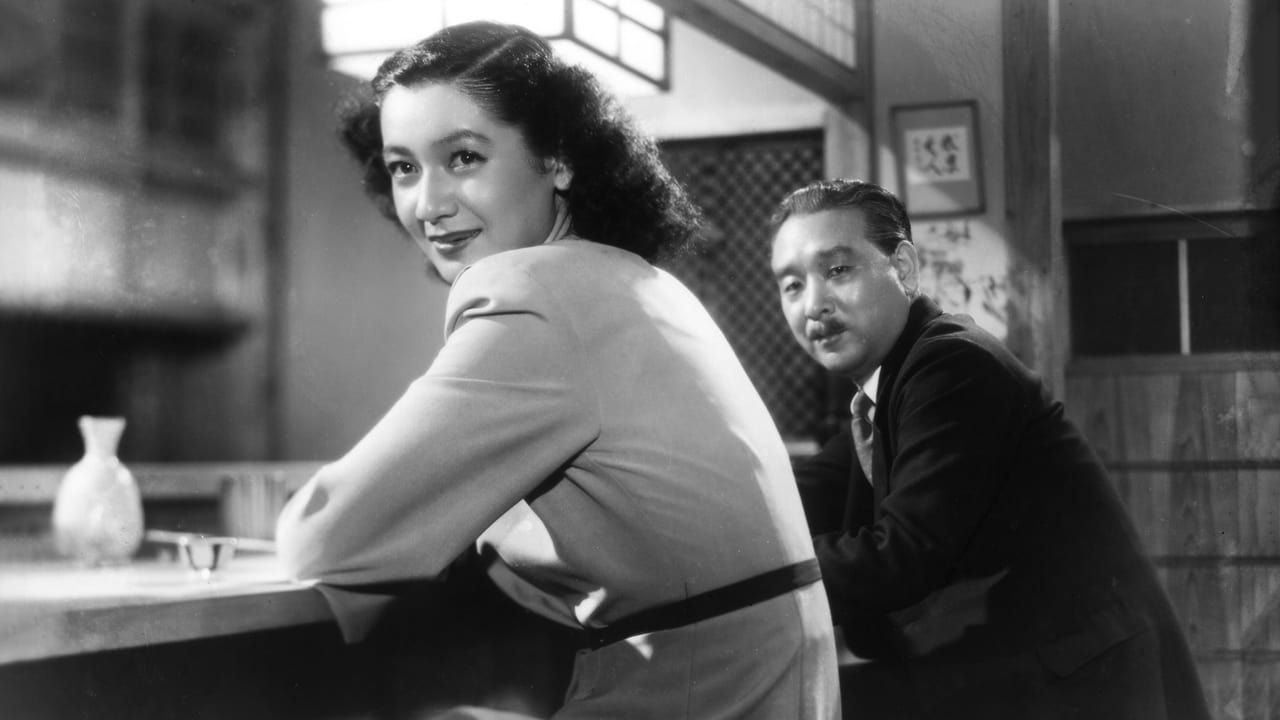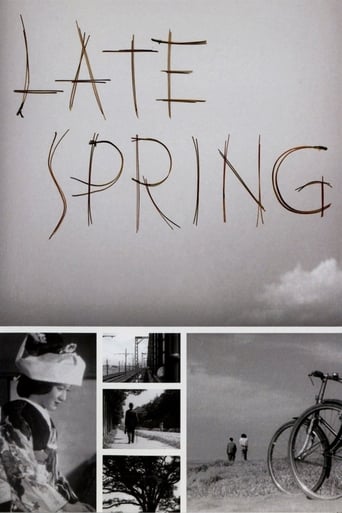

This is the first Yasujirô Ozu I've every seen. It's a beautifully made movie, but honestly, I feel like about 70% of my enjoyment of it was simply Setsuko Hara as Noriko. She is a wonderful actress who seems able to move from joy to quiet sorrow effortlessly. She can say more in silence than most actors can with pages of words.Take her away and I don't know what I would think. It would still be a nice looking movie with a reo-realist influence and a simple yet rather compelling story. But Hara is the reason I care about what happens. Some of the other actors are good (although I found the father too opaque to connect with), but no one can match Hara.My main takeaway from Late Spring is that I need to see more movies starring Hara.
... View MoreNoriko is twenty seven and perfectly content in dutifully serving his father in the domestic household. This is an affront to Aunt Masa, who is of the opinion that a woman of her age is much too old to be staying at home cooking and cleaning and resolves to set her up for dating and eventually (well, a little quicker than that), marriage. For Aunt Masa this is not just a personal crisis but a cultural one; she represent the traditional past in which Noriko's rightful place is in the domestic sphere, but alongside her own husband instead of her ageing father. Late Spring engages with this cultural clash borne out of the modernity of post-war Japan. The previous year a law had passed to allow those over twenty to seek marriage without the consent of their parents. Remarrying and divorce are key actions expressed within the film. And yet for Shukichi it is not a matter of parental permission given to Noriko; it is vital that he trick her into marriage rather than allow her to do so via his patriarchal authority. For Shukichi, marriage is not so much a means to further his own lineage as tradition states, but an opportunity to birth new love and life. Ironically his daughter has the opposing view; she begs forgiveness for even entertaining the idea of enjoying another man's company and leaving his home, and is offended by the thought of him remarrying. Yoshiyasu Hamamura, without a single word spoken, makes this clear in his editing.Late Spring navigates the Japanese home with the utmost attention to geometry and the intimacy within those spaces. Amongst the tea parties, the Noh performances, the grooves of the pagodas, and the meditative zen gardens, the characters are locked in the most rigid of compositions in the domestic sphere. Ozu is infamous for his lack of camera movement - one prominent effect of this being that the compositions are never marred and retain their full force throughout the shot (A similar way in how Kubrick zoomed rather than tracked in Barry Lyndon). Even if a scene calls for the camera to move Ozu is steadfast in his compositional rigidity; in the bicycle ride scene the camera follows Setsuko Hara smoothly, maintaining the confines of the frame and suspending her beaming face aloft in the air with a bizarre, daydream-like quality. Most of the time it is placed right next to the characters as if it was another person kneeling on the tatami mats itself. The flat, perfectly symmetrical POV head shots thrusts us into the intimacies of their conversations immediately. Ozu is less concerned with logical sequencing than he is with letting the image and actors speak for themselves. At times he will simply linger and let the natural ticking of the clock prolong our patience and make the mundane (a closed door, an empty room) agonising. Late into the film, there is an insert of simply a vase, but when we cut back to Noriko, tears are streaming down her face. This seems to me (and it has been highly contested) to be the perfect crystallisation of the still, unmoving life in which she yearns to linger in just a while longer. But she is twenty seven. Setsuko Hara steals much of the spotlight. How could she not, with her beaming, radiant smile, sharply accentuated nose and wide eyes that flutter when she laughs and leak when she begs forgiveness from her father. She is so content to be the housewife (or housedaughter) that when circumstances force a change in her lifestyle you can visually see the color drain from her face and her features crease up. Ozu at times uses the camera as a feeble attempt to shield these fragile emotions. A heartbreaking scene sees Noriko suddenly decide she has 'other plans' and scurry away across the other side of the road, away from her father, where they both then continue to walk along (this mimicry of form was used more than once by Ozu). We do not see her face but we can guess what is streaming down it; it also causes us to re-evaluate every breaming smile she has flashed. Another effect is a momentary pause in Shukichi's stride, for just a slight moment - perhaps he has finally been convinced that his daughter can no longer be shackled to his home. There are many of these moments in Late Spring. The ending is often talked of, but I think the climax of the film's emotions comes earlier. Shukichi has, up to that point, uttered dialogue mostly consisting of quiet affirmations and modest little "Ums" and "Ahs" with his bowed head. But he sees his daughter's hesitation at leaving the household and being married off, and slowly and softly begins a monologue that recalls his own marriage. The late wife and mother was not always happy initially, but the two worked hard together and found happiness and a life to share. It is not only his blessing for Noriko but also an open acknowledgement of the changing times and values; the two marriages have begun in different conditions, and she has a chance that he never had. For me the power of the film lies here; not only does it heart-wrenchingly encapsulate the painful truth of growing up from the father's perspective, but it also casts shade on the rather impromptu decision to wed the widow Miwa. We can gleam such an age-old and tested relationship that appears between the cracks even after one of them has passed on, and the father too wants his daughter to experience this. I think we can guess from this scene that he never had any intention of marrying Miwa, but simply wants the best for Noriko. The speech makes his character whole, and utterly unselfish.
... View MoreI am a fan of Ozu, and was anxious to expand my knowledge of his work by seeing this highly regarded film. Unfortunately, I was not especially impressed with "Late Spring." The pacing of the film is languid for the first hour or so -- I grew quite restless while Ozu painted an overextended portrait of domestic bliss in the household of the central characters -- a widowed father (Chishu Ryu) and his spinsterish yet bubbly daughter (Setsuko Hara). Things turn a bit more interesting as pressure is brought to bear on the daughter to marry at her advanced age of 27 -- this provokes the daughter to turn exceedingly moody and sullen, causing various complications to the marriage her father and aunt are trying to arrange. Since Setsuko Hara specializes in playing super upbeat yet submissive female characters, it was novel to see her in a rebellious and surly mode. However, Setsuko's rebellion doesn't last long and her mood turns back to positive once again rather too abruptly toward the end of the film.Though I am used to watching Japanese films portraying social norms and customs that seem archaic or irrelevant to Western eyes, the cultural/social background of this film was particularly difficult for me to relate to. Meanwhile, the manic mood swings exhibited by Setsuko Hara's character felt artificial and jarring at the same time. Somehow it just didn't hold together for me.If you are an avid fan of Ozu or of Japanese cinema then by all means see "Late Spring." However, if you want to see the best of Ozu I would recommend instead that you see the justly celebrated "Tokyo Story," the 1959 version of "Floating Weeds" and "I Was Born But..."
... View MoreOnce again, as it would be with his most celebrated film, Tokyo Story (number 3 on the Sight & Sound Greatest Films of All Time list, while this could only manage a feeble 15th), Yasujiro Ozu's genius is in lulling the viewer into the film's gentle rhythms, and gradually layering intricate detail, until by the end one feels as if one really knows these characters, their fears and desires, the timbre of their everyday lives.Noriko (Setsuko Hara) can't bear to leave her beloved father (Ozu favourite Chishu Ryu) and marry. Her agony is a form of grief, and her decision to move on is overshadowed by an agonising ambivalence. Noriko's luminous face is locked in a smile for the first hour, and it's a face that suits smiling; when the smile vanishes we grieve for her former joy.What begins as soap opera gradually emerges as a dense, detailed and moving portrayal of the painful transition between family generations (hence the film's end-of-season title), as well as the transition from tradition to modernity. The film is primarily concerned with the individual's relationship with the family and with broader society in postwar Japan. For all his apparent gentleness, this is a filmmaker with an unflinching sense of social conscience, nostalgic and yet progressive.As usual for Ozu, careful composition reigns over camera movement. At an aesthetic level this makes him the antithesis of Akira Kurosawa, whose Rashomon (released the following year) would pioneer dynamic techniques still used in the mainstream today. Ozu could not be called mainstream by today's standards. Late Spring, like all his films, demands patience and empathy on the part of the viewer. But, as always, one is richly rewarded.
... View More